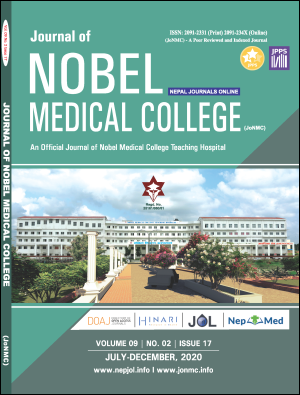Gender Differences in the Clinical Characteristics of Patients with Acute Coronary Syndrome in the Eastern Region of Nepal
DOI:
https://doi.org/10.3126/jonmc.v9i2.33320Keywords:
Acute coronary syndrome, Gender, Study characteristics, Treatment outcomeAbstract
Background: Studies from other regions show gender-based differences in the clinical characteristics of patients with the acute coronary syndrome (ACS) with conflicting results. There is a lack of definite data from our population.
Materials and Methods: This is a hospital-based cross-sectional study in patients with ACS admitted to the tertiary care center from January 2019 to June 2020. Risk factors, co-morbidities, clinical symptoms, duration of symptoms onset, modalities of treatment offered, complications, and in-hospital outcome were noted in the pre-structured questionnaire by convenient sampling. Data were analyzed by using Microsoft excel 2007 and SPSS 20.
Results: Among 384 participants, 65.9% were male and 34.1% were female. The mean age of males was 60.6 ± 12.1 and females 62.3 ± 11.1 years (P=0.21). Females had a higher prevalence of dyslipidemia (p<0.001). The prevalence of hypertension, diabetes, and smoking was similar. The mean hemoglobin level was higher in males (11.8 ± 2.2 gm/dl vs. 11.1 ± 4.57 gm/dl, P = 0.01). The majority presented with chest pain (94.9%) in males and 87.8% in females, P=0.44), and sweating (76.7% in males and 80.2% in females, P=0.43). Non-anginal symptoms were almost similar in both the genders except nausea which was more common in males (P=0.03). The timing of presentation, treatment with reperfusion therapy, and arterial territory involved were not significantly different. Prevalence of mechanical and arrhythmic complications as well as mortality was similar.
Conclusion: Our study did not show significant gender-based differences in clinical profile, treatment modalities, in-hospital complications, and mortality.
Downloads
Downloads
Published
How to Cite
Issue
Section
License
JoNMC applies the Creative Commons Attribution (CC BY) license to works we publish. Under this license, authors retain ownership of the copyright for their content, but they allow anyone to download, reuse, reprint, modify, distribute and/or copy the content as long as the original authors and source are cited.




